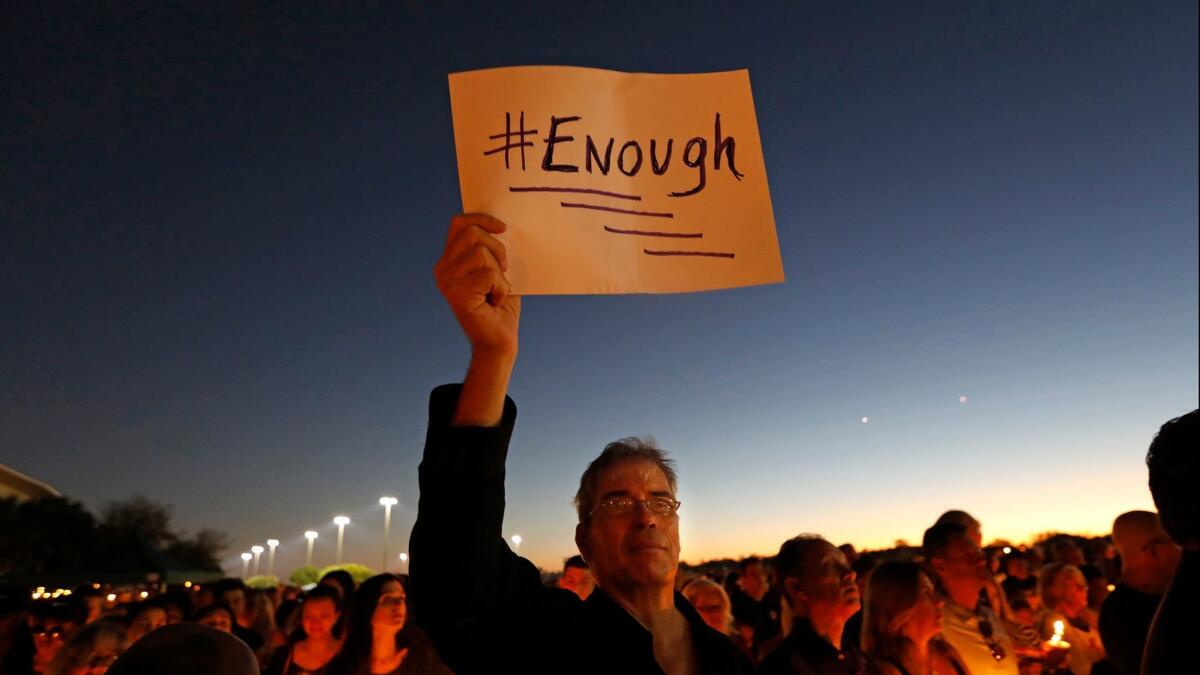Column: No one becomes a mass shooter without a mass-shooting gun

- Share via
Reporting from Sacramento — Look, it’s really simple: Mass shootings will continue in this country until we finally ban mass-shooting weapons.
The more bullets a gun can fire rapidly, the more people will die.
Pretty basic stuff. We don’t need to twist elementary logic into a contortion.
Anyone who doesn’t understand this is probably a firearms addict in denial.
Let’s be clear: I’m not anti-gun. I grew up shooting, have owned firearms all my life and enjoyed them. I’m pro-common sense.
There’s absolutely no reason to possess a semiautomatic, military-style rifle with large-capacity ammunition magazines except to kill lots of people within a few minutes.
It’s not a good hunting weapon. And for personal protection, you’re better off with a 12-gauge shotgun or a handgun. Of course, with those weapons at home, you also might shoot a family member or yourself.
Sorry, but all these gun killings and the national politicians’ inaction afterward are getting old and repetitious. It’s like the movie “Groundhog Day.”
Regarding movies, yes, too many flicks extol gratuitous violence and sow evil seeds in vulnerable kids’ minds. Video games are worse. But again, no one in real life becomes a mass shooter without a mass-shooting gun.
Immediately after last week’s South Florida school shooting that left 17 dead and 14 wounded, there was the usual strained finger-pointing at the lack of mental health treatment. Baloney!
Sure, anyone who murders is a wacko. But that doesn’t mean they’re clinically mentally ill. No more than 5% of all violence is committed by the mentally ill, according to Garen Wintemute, director of the UC Firearm Violence Research Center.
Certainly there should be better mental health care. The suspect was a troubled 19-year-old ripe for therapy.
Nikolas Cruz had been kicked out of school and his mother had just died. Even before that, he reportedly had tormented neighbors — bit a kid’s ear, threw eggs at a car, shot chickens with a BB gun. He’d posed with guns on Instagram and declared on YouTube: “I’m going to be a professional school shooter.”
Steve Lopez: Yes, gun control. But here’s another measure to keep us safe »
He probably couldn’t have shot 31 victims with a six-shooter or pistol holding nine rounds. He would have needed to pause to reload, giving his former schoolmates a few seconds to flee or jump the guy.
Instead, Cruz went to the high school armed with a weapon of choice for mass killers: a semiautomatic AR-15 rifle — the civilian knockoff of the military M-4 — and several magazines. He had bought the weapon legally in Florida, which has weak gun laws.
More of the country should be following California. We banned the sale of such assault weapons many years ago.
In 2016, we took another big step. The Legislature passed a bill and the voters overwhelmingly approved a separate ballot initiative outlawing the possession of magazines holding more than 10 rounds.
But attorneys for the National Rifle Assn. persuaded U.S. District Judge Roger T. Benitez of San Diego to issue a preliminary injunction blocking the large magazine ban. The California Rifle and Pistol Assn. argued that the ban violated 2nd Amendment rights to bear arms and also protections against government seizure of property without due process or compensation.
Nonsense on the first count. The late conservative U.S. Supreme Court Justice Antonin Scalia wrote in a 2008 opinion affirming the right of individuals to own firearms: “The right secured by the Second Amendment is not unlimited. … The right was not a right to keep and carry any weapon whatsoever in any manner whatsoever and for whatever purpose.”
The gun lobby’s second count was on target: The state government shouldn’t be forcing citizens to surrender their ammo magazines without compensation. If the state wants the magazines, it should buy them.
California and every other state should do a better job of detecting potential killers and seizing their guns. Cruz was waving red flags. The FBI didn’t see them.
Coverage of California politics »
Someone close to Cruz called FBI officials last month to report that he had purchased a firearm, threatened a family member and posted scary messages on social media. But proper “protocols were not followed,” FBI Director Christopher Wray acknowledged.
A California law allows immediate family members and law enforcement to seek a gun violence restraining order against someone suspected of being dangerous. If granted by a court, the order forces the person to temporarily turn over his firearms. That might have helped in South Florida.
Assemblyman Phil Ting (D-San Francisco) got a bill passed two years ago that also would have permitted school staffs, co-workers and mental health specialists to seek a restraining order. Gov. Jerry Brown vetoed the bill, saying it was “premature” because the original law had only been in effect a short time.
Now Ting says he’ll reintroduce the bill. “More time has passed and we’ve seen more and more shootings in schools and workplaces,” the lawmaker says.
What Congress should do — and won’t as long as Republicans and the NRA control Washington — is ban the mass-shooting weapons. California Sen. Dianne Feinstein tried to do that with a 1994 bill that expired 10 years later. The politicians refused to renew it.
“Now guns are more powerful. High-capacity magazines are now larger. And even bullets are more destructive,” Feinstein says. “We become culpable when we do nothing to stop it. ... I’m tired of children getting shot.”
But too many of her colleagues never get tired of pandering for gun lobby support.
To read this article in Spanish, click here
Follow @LATimesSkelton on Twitter
More to Read
Get the L.A. Times Politics newsletter
Deeply reported insights into legislation, politics and policy from Sacramento, Washington and beyond. In your inbox twice per week.
You may occasionally receive promotional content from the Los Angeles Times.











